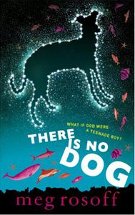There is no dog by Meg Rosoff

Penguin, 2011. ISBN 9780141327181.
(Age: 16+)Imagine if the creator of the world is a typical
teenage boy, Bob, self-obsessed, thoughtless and sex mad. His mother
is a gambler and hard drinker who loses Bob's pet Eck, a strange
penguin like creature, at a card game with the mighty Emoto Hed who
decides that he will eat it, much to the horror of his daughter
Estelle. And then there is long suffering Mr B who tries to clean up
after Bob's messes and finds it depressing to attempt to answer all
the prayers for help. Lucy, the beautiful young girl that Bob falls
in love with works at the local zoo, and Bob, head over heels in
lust, plays havoc with the weather while he courts her. Floods and
droughts cause chaos in the world.
Rosoff has come up with a hard hitting idea to why the world is in
trouble today with floods and famine, whales and other species
extinct or endangered. It is because Bob is too careless to spend
time on his creations or to think through the implications of what
he does. Bob is a totally unlikeable character, or god, with no
apparent good features except for the occasional brilliant creation.
The anagram in her title There is no dog, is a further hint
to what Rosoff is thinking, although her little group of gods appear
to be more like the gods of Olympia rather than the God of
Christianity.
As I read the book I kept thinking that the themes were more of an
adult nature rather than ones that would appeal to teenagers.
Certainly her premise of Bob being God, and only interested in
beautiful girls, is one that will not go down very well in Christian
schools. However I couldn't stop reading it, the inclusion of the
last Eck in the world under threat of being eaten was a suspense
maker, and I had to find out what would happen to him in the end!
Rosoff has written a challenging and uncompromising satire that is
sure to be a discussion starter among adults who read adolescent
fiction. It is definitely a book for older, experienced
readers, because of the content and the complexity of the
ideas.
Pat Pledger